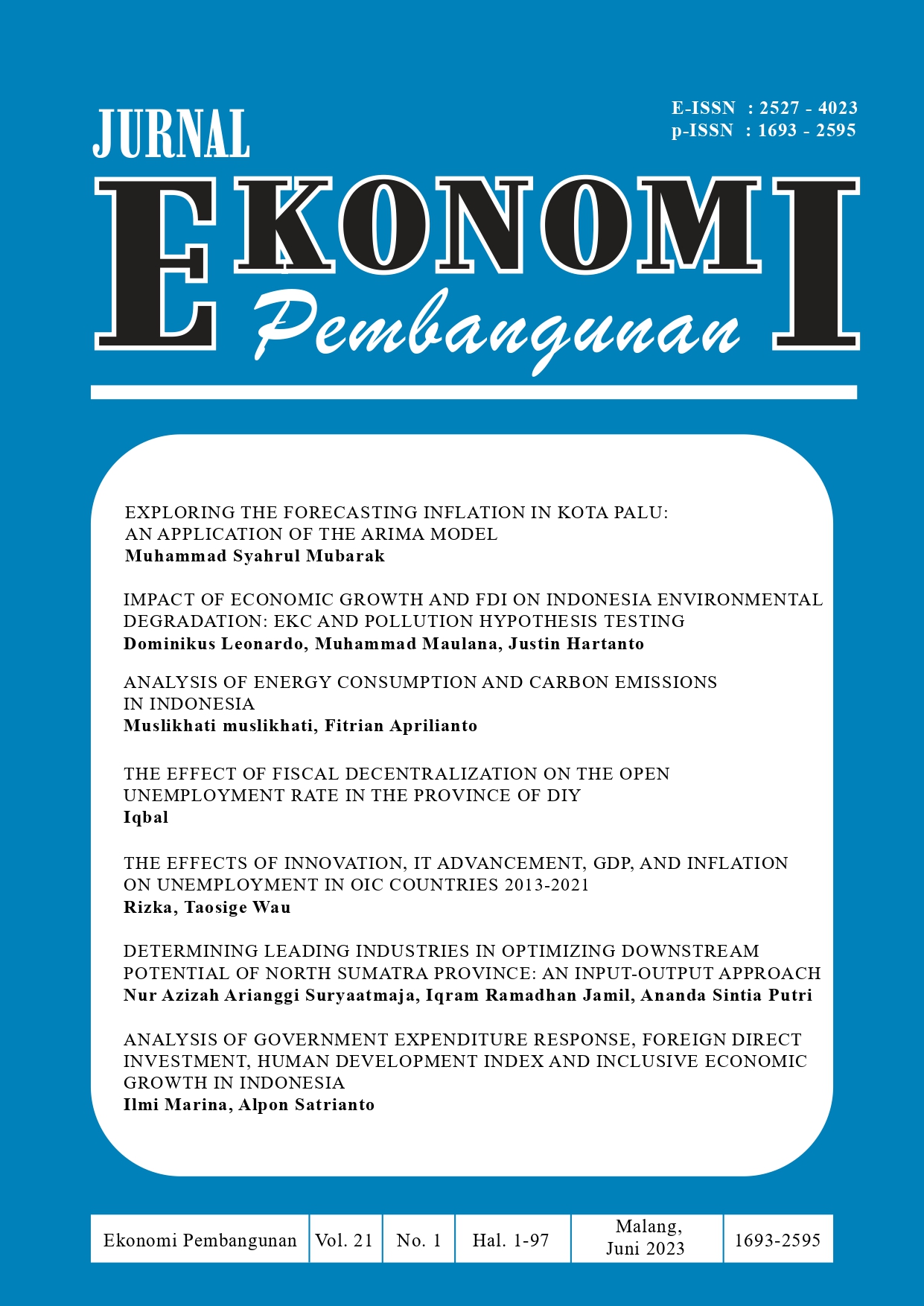The Effects of Innovation, IT Advancement, GDP, and Inflation on Unemployment in OIC Countries 2013-2021
DOI:
https://doi.org/10.22219/jep.v21i01.24835Keywords:
Unemployment, Innovation, IT Advancement, GDP, InflationAbstract
Unemployment still becomes a major developmental challenge in some OIC member countries. Thus, employment determinants in those countries need to be investigated through empirical research. This study analyzes the influences of inflation, GDP, IT advancement, and innovation on unemployment in some OIC member countries. We use the purposive sampling method with criteria of countries with the past decade's average unemployment rate lower than 6%. We employ panel data from 20 countries fulfilling the requirements in 2013-2021. The panel data regression method with a fixed effect approach is used to analyze the influence of independent variables on the dependent variable. The results indicate that inflation and GDP significantly and negatively affect unemployment. On the other hand, innovation and ICT advancement have a negative but insignificant effect on the dependent variable. Regarding the results, we believe it is essential for the government as a policymaker to arrange appropriate regulations allowing industries to enhance their productivity to enlarge job opportunities and alleviate unemployment.
Downloads
References
Acemoglu, D. & Restrepo, P. (2020). Robots and Jobs: Evidence from US Labor Markets. Journal of Political Economy, 2020, 128(6)
Borjas, G. J. (2020). Labor Economics 8th Edition. McGraw-Hill Education
Ebaidalla, M. (2016). Determinants of Youth Unemployment in OIC Member States: A Dynamic Panel Data Analysis. Journal of Economic Cooperation and Development, 37(2) 81-102
Ehrenberg, R. G. & Smith, R. S. (2012). Modern Labor Economics: Theory and Public Policy 11th Edition. Pearson Education Inc.
Feldmann, Horst. (2013). Technological Unemployment in Industrial Countries. Journal of Evolutionary Economics 23(5) 1099-1126
Hanis, F. N. & Zeki. A. M. (2016). ICT Readiness and Information Security Policies in OIC Countries. International Journal of Scientific and Research Publication 6(1)
https://www.globalinnovationindex.org
Maijama’a, R. et al. (2019). Impact of Population Growth on Unemployment in Nigeria: Dynamic OLS Approach. Journal of Economics and Sustainable Development 10(22)
Mankiw, N. G. (2010). Macroeconomics 7th Edition. New York. Worth Publishers
Matuzeviciute, K. et al. (2017). Does Technological Innovation Affect Unemployment? Some Empirical Evidence from European Countries. Economies 5(48)
Metu, A. G. et al. (2019). Ending Youth Unemployment in Sub-Sahara Africa: Does ICT Development have any Role? The 2019 African Economic Conference
Okun, A. M. (1962). Potential GNP: Its Measurement and Significance. Cowles Foundation Paper 190
Postula, M. et al. (2021). The Impact of Information and Communication Technologies (ICT) on Energy Poverty and Unemployment in Selected European Union Countries. Energies 14(6110)
Pyndick, R. S. & Rubinfeld, D. L. (2013). Microeconomics 8th Edition. New Jersey. Pearson Education Inc.
Romer, David. (2012). Advanced Macroeconomics 4th Edition. New York. McGraw-Hill Irwin
Ruchba, S. M. & Hadiyan, F. (2019). Analysis of Unemployment and Inflation in Indonesia for 1980 -2016 using the Philipps Curve Approach. Proceeding of the 3rd International Conference on Accounting, Business & Economics
Schumpeter, J. A. (1934). The Theory of Economic Development: An Inquiry into Profits, Capital, Credit, Interest and The Business Cycle. New Brunswick. Transaction Publishers.
SESRIC OIC. (2020). OIC Labour Market Report 2020. Statistical, Economic and Social Research and Training Centre for Islamic Countries (SESRIC)
SESRIC OIC (2021). OIC Economic Outlook 2021. Statistical, Economic and Social Research and Training Centre for Islamic Countries (SESRIC)
Shin, Soon Ho. (2017). The Impact of Intellectual Property on Provincial Unemployment Rates in South Korea. MPA/MPP/MPFM Capstone Projects. 282
Sitompul, T. & Simangunsong, Y. (2019). The Analysis of the Impact of GDP, FDI, and Minimum Wage on Employment in Indonesia. International Journal of Management, Entrepreneurship, Social Science and Humanities (IMESH) 2(2) 53-62
Sledzik, Karol. (2013). Schumpeter's View on Innovation and Entrepreneurship. SSRN Electronic Journal DOI. 10.2139/ssrn.2257783
Umam, A. K. & Wardhana, O. H. P. (2020). Investment, Debt Instruments, and Economic Growth: Their Impact on The Unemployment Rate of OIC Countries in the Asian Region. Journal of Islamic Economics Lariba 6(2) 1-18
Vivarelli, Marco. (2015). Innovation and Employment. IZA World of Labor 154
Wibowo, M. G. (2019). Human Capital Relation with Welfare in Indonesia and ASEAN Countries. Economic Development Analysis Journal 8(1)
Wooldridge, J. M. (2013). Introductory Econometrics: A Modern Approach 5th Edition. Ohio: Cengage Learning
Wulandari, D. et al. (2019). Nexus between Inflation and Unemployment: Evidence from Indonesia. Journal of Asian Finance, Economics and Business 6(2) 269-275
Downloads
Published
Issue
Section
License
Copyright (c) 2023 Rizka, Taosige Wau

This work is licensed under a Creative Commons Attribution-NonCommercial-ShareAlike 4.0 International License.
Authors who publish with Jurnal Ekonomi Pembangunan (JEP) agree to the following terms:
- For all articles published in Jurnal Ekonomi Pembangunan (JEP), copyright is retained by the authors. Authors permit the publisher to announce the work with conditions. When the manuscript is accepted for publication, the authors agree to the publishing right's automatic transfer to the publisher.
- Authors retain copyright and grant the journal right of first publication with the work simultaneously licensed under a Creative Commons Attribution-NonCommercial-ShareAlike 4.0 International License that allows others to share the work with an acknowledgment of the work's authorship and initial publication in this journal.
- Authors can enter into separate, additional contractual arrangements for the non-exclusive distribution of the journal's published version of the work (e.g., post it to an institutional repository or publish it in a book), with an acknowledgment of its initial publication in this journal.
- Authors are permitted and encouraged to post their work online (e.g., in institutional repositories or on their website) before and during the submission process, as it can lead to productive exchanges and earlier and greater citation of published work (See The Effect of Open Access).

This work is licensed under a Creative Commons Attribution-NonCommercial-ShareAlike 4.0 International License.






















